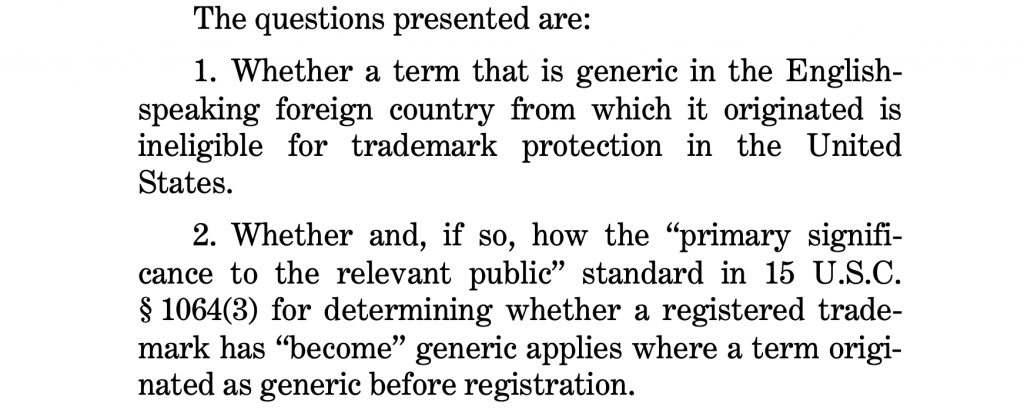The U.S. Supreme Court will not take on a case over the trademark-protected name of Ugg boots following a years-long, bi-national trademark fight that has pitted Ugg owner Deckers Outdoor Corp. against Australian Leather Pty. Ltd. The Supreme Court’s denial of certiorari follows from the U.S. District Court for the Northern District of Illinois 2018 rejection of Australian Leather’s argument that “ugg” is a generic and unprotectable term – in Australia and the U.S. – for a type of sheepskin boot that came out of the Australian surfing community in the 1960s. It also comes after a jury found that Australian Leather had, in fact, infringed Deckers’ trademarks by selling Ugg-branded boots in the U.S., and awarded Deckers $450,000 damages as a result. After a subsequent decision from the Court of Appeals for the Federal Circuit affirming the outcome of the trial, Australian Leather sought Supreme Court intervention.
At the heart of Sydney-based footwear company Australian Leather’s since-denied petition for certiorari is its argument that a circuit split exists in the application of the doctrine of foreign equivalents, which prohibits trademark protection for generic terms of foreign origin. While the foreign equivalents test “usually only applies to words translated from a foreign language,” according to Bracewell LLP attorneys Timothy Geiger, Carlton Wilde, and Joshua Gold-Quirós, and thus, not to English words, Australian Leather “specifically cited cases from the Second, Seventh, and Fifth Circuits in which the courts also considered the meaning of the phrase in its place of origin as a part of its analysis.”
“Application of the doctrine [of foreign equivalents] has split the courts of appeals and led to the unjustified conclusion that although generic terms in foreign languages cannot be trademarked, the same rule will not be applied to generic terms that originated in other English-speaking countries,” Australian Leather argued in the petition for certiorari that it filed in October.

The second issue that Australian Leather raised in its bid for Supreme Court review centered on whether – and, if so, how – the “primary significance to the relevant public” standard for determining whether a registered trademark has “become” generic applies if a term actually originated as a generic term before registration. According to Australian Leather, “Australians have referred to a style of sheepskin boots using the generic term ‘ugg’ for decades,” and the generic term “came to the United States in the 1960s and 1970s, and was used by early adopters, especially in surfer communities, as a generic descriptor.” Given that the term “ugg” was generic in Australia and U.S. before Deckers’ “Ugg” trademark was registered, the boot-maker claimed that the district court erred in applying the primary significance test.
In rejecting the bid for appeal, the Supreme Court leaves the Federal Circuit decision in favor of Deckers in place.
The closely-watched case first got its start in 2016 when Deckers sued Australian Leather in federal court in Illinois, accusing the Sydney-based footwear company of infringing its “Ugg” trademark, which it has maintained U.S. registrations for since 1987. Australian Leather responded with claims of its own, seeking a declaration that Deckers’ “Ugg” mark is generic, and thus, invalid, in accordance with the doctrine of foreign equivalents given its generic status in Australia. In a September 2018 order, the U.S. District Court for the Northern District of Illinois rejected Australian Leather’s argument that “ugg” is a generic term – in Australia and the U.S. – for sheepskin boot, and granted Deckers’ motion for summary judgment.
In the process, the court shot down Australian Leather’s counterclaims, including its false designation of origin argument, in connection with which the company alleged that Deckers has misled consumers by marketing its boots as a product of Australia when UGG moved its manufacturing out of Australia and to other locales, such as China, after being acquired by Deckers.
Reflecting on the case last month ahead of the Supreme Court’s certiorari determination, Geiger, Carlton Wilde, and Gold-Quirós stated that for “international companies hoping to introduce products or services into the United States, a careful analysis of potential trademarks and their foreign equivalents is crucial.” This includes, as Australian Leather has learned, “one must be wary of United States trademark rights for terms that are generic for a product in the country of origin.” They note that “similar concerns also exist for U.S. companies hoping to enter foreign markets with terms considered generic in the U.S., but not in prospective foreign markets.”
The case is Deckers Outdoor Corp., v. Australian Leather Pty. Ltd., et al. 1:16-cv-03676 (N.D. Ill.)













